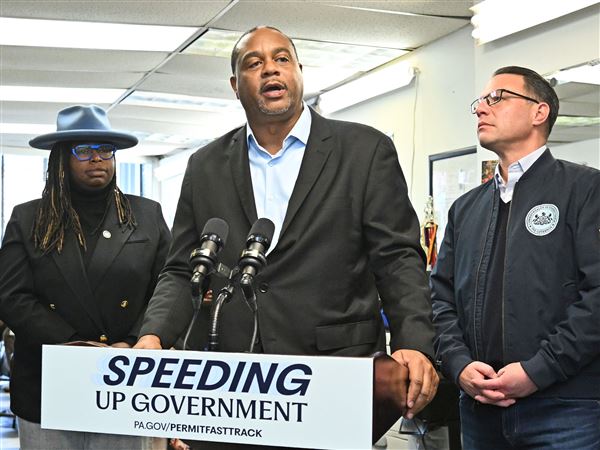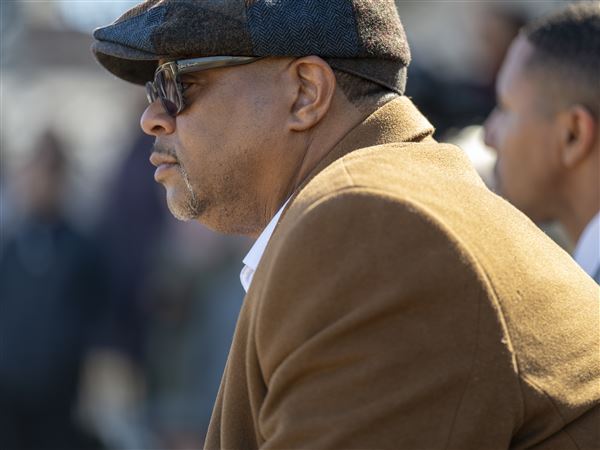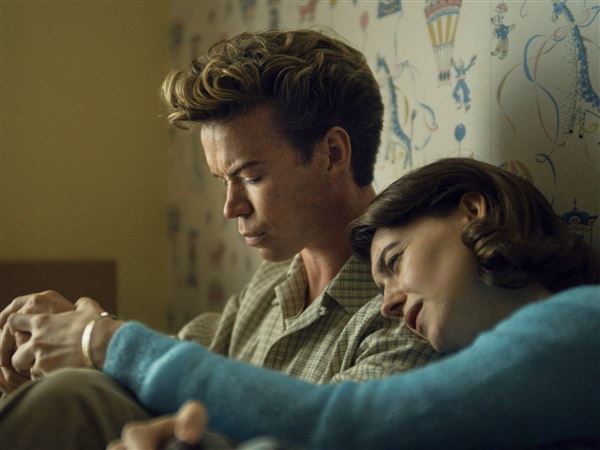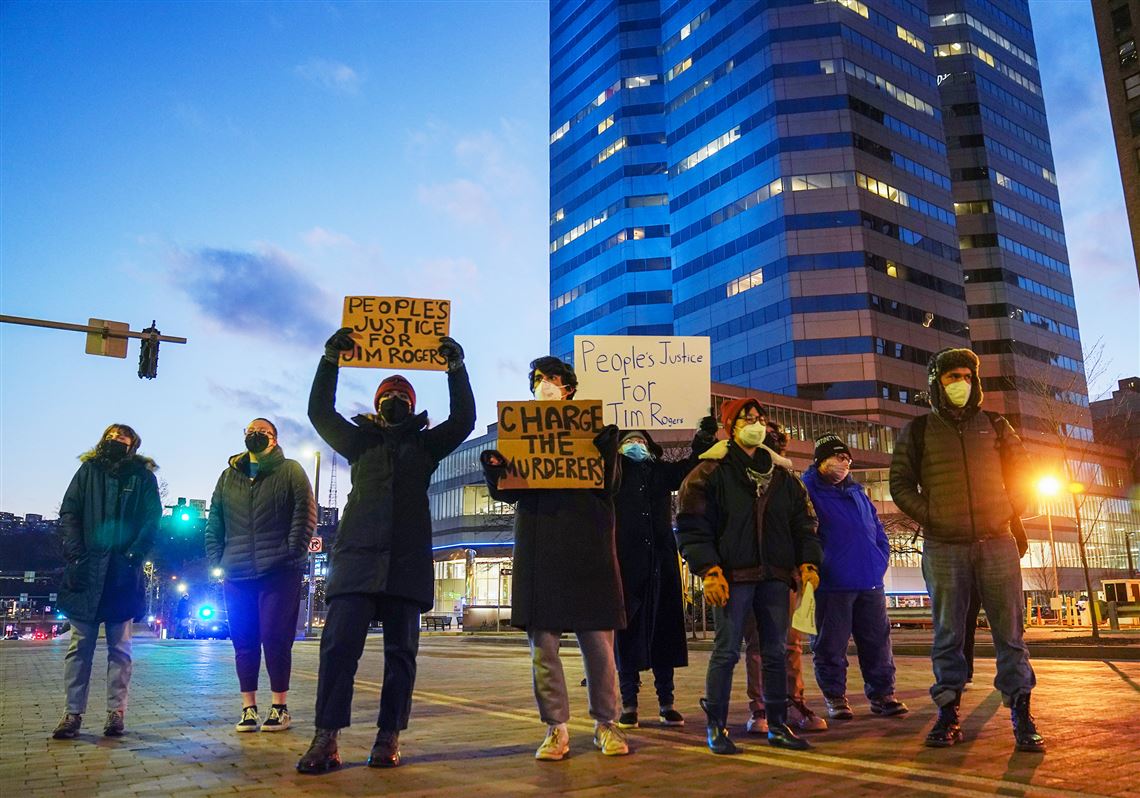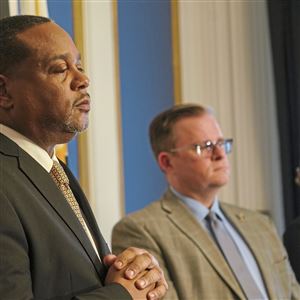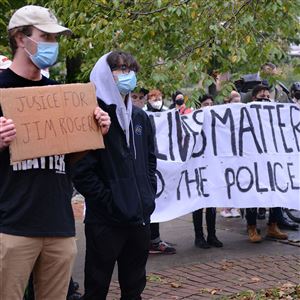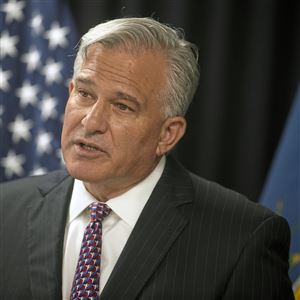Protesters gathered in Downtown Pittsburgh on Friday to urge the Allegheny County district attorney to file charges against police officers involved in the death of a man in Bloomfield and not rely on a grand jury to determine whether the officers committed a crime.
Devon Adwoa, a spokeswoman for the family of Jim Rogers, said a grand jury investigation would be “an excuse” by the district attorney not to directly prosecute officers involved in the death of the 54-year-old Black man in October. Mr. Rogers died a day after being struck by a Taser repeatedly during a stop by police in response to a report of a stolen bicycle.
While District Attorney Stephen A. Zappala Jr. has not announced that the case will go to a grand jury, Mike Manko, his spokesman, said Mr. Zappala has had extensive conversations with Cindy K. Chung, the U.S. attorney for the Western District of Pennsylvania.
Mr. Manko would not elaborate, but Ms. Chung’s office in general could investigate possible civil rights violations by the police against Mr. Rogers. Her office typically would not be involved in the prosecution of a charge of criminal homicide. The U.S. Attorney’s office would not comment on the matter later Friday.
The protesters’ call Friday to forgo a grand jury investigation may have come too late.
Patrick Thomassey, an attorney representing Sgt. Carol Ehlinger, one of the officers involved in the Rogers case, said the sergeant had already been contacted about testifying before in a county grand jury investigating the Rogers incident.
“Justice is not private proceedings, justice is not secret to the people, justice is out in the open, and justice is a charge of all these officers,” Ms. Adwoa said to a group of about 30 in front of the City-County Building during Friday’s rally.
“We demand Stephen Zappala use his power to charge all officers involved in the murder of Jim Rogers,” Ms. Adwoa continued, following a chant of, “Charge these officers.”
Ms. Adwoa also accused municipal officials, including Pittsburgh Mayor Ed Gainey and former Mayor Bill Peduto, of upholding a system that led to Mr. Rogers’ death.
In December, while Mr. Peduto was still in office, the city announced it would discipline nine officers involved in the incident.
In late January, disciplinary proceedings began against eight of the officers for violating police bureau policies. The result of those hearings has not been released publicly.
About the same time that the hearings began, Mr. Zappala’s office learned it had been denied access to a 15-page summary of an internal police report detailing the officers’ involvement in the arrest and subsequent death of Mr. Rogers. Mr. Zappala had expressed interest in prosecuting the case and requested the document Dec. 22.
“Such a document would be enormously valuable in order to further conduct an exhaustive investigation,” Mr. Zappala’s office had written in a request to Judge Jill E. Rangos, administrative judge of the criminal division of Allegheny County Common Pleas Court, to release the summary.
“This is a prime example of the hurdles that are faced when conducting an investigation, and we respectfully disagree with the judge’s decision,” Mr. Manko said after the denial.
The DA’s office also had said it would wait until the results of a Medical Examiner’s Office investigation of the death before deciding whether to prosecute.
On Jan. 3, that office concluded the death was accidental, caused by interrupted blood flow to the brain. That condition, called acute global hypoxic ischemic injury, is commonly seen in cardiac arrest patients.
Friday evening’s gathering was the third time since October that the Justice for Jim Rogers group had met in front of the City-County Building.
“A man lost his life here,” said Toy Slaughter, an activist with Justice for Jim Rogers. “A man who then cried help for 17 minutes.”
She continued, “It’s not a good look for Pittsburgh not to charge these officers. They’re supposed to be serving and protecting.”
“We’re not in it for the money. We’re not in it because we want to look good. We’re in it because we care about the people in our community,” Ms. Adwoa said into a megaphone. “And we care about justice.”
First Published: February 19, 2022, 11:00 a.m.
